Top 5 Docker Swarm tutorials
At Dockercon '16 in Seattle last June Docker released a complete re-think on their orchestration offering called Swarm. Swarm has been gaining momentum and key features ever since.
Get ready for Dockercon 2017 with my top 5 Docker Swarm tutorials
 Pictured - Serverless FaaS on Raspberry Pi with Swarm
Pictured - Serverless FaaS on Raspberry Pi with Swarm
You can read more about Dockercon in Seattle in my Dockercon 2016 speaker notes.
1. Get to scale in 5 minutes
My first tutorial on the new Swarm offering (also called Swarm Mode) was written and tested with a pre-release candidate of Docker. I wrote this the night before the official announcement in Seattle.
It's still as relevant today as it was last year. Get started in 5 minutes.
Learn Docker Swarm Mode - scale in 5 minutes!
2. Work with a real micro-service
My second tutorial on Swarm mode focused on a small microservice written in Node.js. If you're wondering how to get started with Node and Swarm then you will find everything you need here.
Scale a real microservice with Docker 1.12 Swarm Mode
3. Swarm Deep dive on Raspberry Pi
Installing Docker on a Raspberry Pi has never been easier. The Raspberry Pi foundation covered Docker on their official blog earlier last year and this generated a lot of interest in Swarm on the Pi.
The Raspberry Pi is effectively a very cheap, networkable PC and whatever applies to a PC or cloud server can normally be run on a Pi too.
The Pi is an accessible platform for teaching and demonstrating distributed computing. In this blog post I go into deeper detail on how to set up your RPi swarm and how to test different aspects of inter-container communication.
Live Deep Dive - Docker Swarm Mode on the Pi
The video uses a set of tests that cover everything from scaling to inter-container communication via DNS.
4. Test-drive Docker Healthchecks
Healthchecks are an essential feature for deploying your production application. They provide a way for your container to check itself periodically. Swarm's self-healing mechanism can then intervene and help resolve issues automatically.
Test-drive Docker Healthcheck in 10 minutes
5. Secret management
Swarm now provides a built-in and secure method to manage confidential secrets, tokens and keys. This blog post goes into detail on how to apply secret management to an integration with a real-world service.
Docker Secrets in action: Github integration
Subscribe for more
Don't miss out on announcements, reviews, tutorials and blog posts. Fill out your email below or subscribe with the Feedly blog reader.
You might also like:
Multi-stage builds
Multi-stage builds are a game changer for CI/CD pipelines that rely on containers. Find out how to ship leaner images spending less time doing it.
Builder pattern vs. Multi-stage builds in Docker
Functions as a Service (FaaS) Functions as a Service (FaaS) is an easy-to-use framework for doing serverless with Docker. It is ideal for integrating with Webhooks and events from third-party or internal services with minimal effort.
It recently reached 1k Github stars. Take it for a test-drive online in less than 60 seconds:
Wow my serverless FaaS project is almost at 1k Github stars. Thanks to everyone who's helped along the way! https://t.co/2xkJKvjosi pic.twitter.com/t9OL8zJHfi
— Alex Ellis (@alexellisuk) April 8, 2017